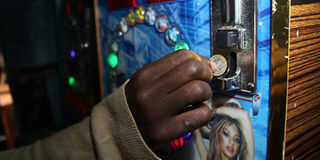Team asks MPs to reduce gambling tax

A person inserts a coin into a fixed-odds betting terminal in Githurai on November 27, 2015. The National Assembly has been told to reduce betting tax in a Bill it's considering. PHOTO | ANTHONY OMUYA | NATION MEDIA GROUP
What you need to know:
- House experts criticised The National Treasury’s decision to increase the number of goods liable to be charged value-added tax.
- The Treasury has proposed to increase taxes on betting, lottery, gaming and competitions to a uniform 50 per cent,
- This week, MPs are scheduled to finish processing the Rotich Bill, among whose proposals is the zero-rating of maize flour and bread.
Parliament’s experts on economic policy and budgeting have urged legislators to reduce the proposed “punitive” taxation on gaming firms and instead come up with ways to curb illegal gambling.
They also criticised the National Treasury’s decision to increase the number of goods liable to be charged value-added tax, as a reversal of gains in the review of the VAT Act in 2013.
The Treasury has proposed to increase taxes on betting, lottery, gaming and competitions to a uniform 50 per cent, which Cabinet Secretary Henry Rotich said was aimed at reducing the negative social effects of gambling and also raise revenue.
But according to the Parliamentary Budget Office (PBO), this would be punitive and the assumption that taxation alone was the solution is wrong.
RESTRICT GAMBLING
In a presentation made to the Finance Committee, PBO called for a slight reduction in the proposed tax and ensuring that gambling takes place only in authorised establishments.
PBO’s recommendations echo the sentiments of the industry as well as Gem Member of Parliament Jakoyo Midiwo, whose Bill to restrict gambling was put on the back burner after MPs faulted it and the Labour and Social Welfare Committee recommended its rejection.
Mr Midiwo and players in the industry have described illegal gambling dens, where low-cost slot machines are used, as a social ill that needs to be tackled.
MAIZE FLOUR AND BREAD
This week, MPs are scheduled to finish processing the Rotich Bill, among whose proposals is the zero-rating of maize flour and bread.
The two are exempt from VAT under the 2013 law.
The change, via the Finance Bill, would allow millers and bakers to claim input tax rather than pass it on to consumers.
This means that the price of maize flour and bread would reduce.
Manufacturers add VAT, which is charged at 16 per cent, to the ex-factory price of the goods they produce.
Last week, National Assembly Majority Leader Aden Duale said it was upon Mr Rotich to propose the changes to the Bill that would lower food prices.





